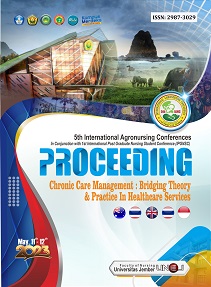DEPRESSION IN PATIENT WITH HEART FAILURE: A SCOPING REVIEW
Abstract
Background: Heart failure is a primary health problem for people globally. Depression is the most commonly experienced as comorbid disease in heart failure patients. Depression is difficult to be recognized and poorly treated by patients or clinicians and potentially reduce the quality of life. Purpose: This study focused on exploring about the prevalence of depression and factors related to depression in heart failure patients. Method: This research was a scoping review with patients of heart failure as its population. The search was conducted through electronic databases such as PubMed, CINAHL, and Google Scholar using keywords: Heart Failure and Depression. Articles were published in English in 2010-2020. Data were analyzed using content analysis. Results: Based on article review, it found that ≥ 18% of the total sample in each studies met the criteria of depression. Eight of 19 articles related to depression of patient with heart failure had mild to moderate depression. The prevalence of depression in heart failure are related to 25 sub-factors which are categorized into 3 main factors, namely: biological factors (i.e. inflammatory biomarkers, NYHA functional class classification, physical symptoms of HF, etiology of HF, age, gender, and history of ischemic heart disease), behavioral factors (i.e. lifestyle, self-care behavior, smoking, obesity), and psychosocial factors (i.e. social support, spiritual well-being, personality, uncertainty, stress/history of depression, duration of illness, resuscitation history, quality of life, doctor visits, marital status, life situation, knowledge, economic conditions, recreational activities). Conclusion: This study shows that heart failure patients are at a high risk for developing depression so that managing associated factors to prevent depression symptoms is very urgent to prevent worsening disease prognosis.
Keywords: Depression; Heart Failure; Patients.









